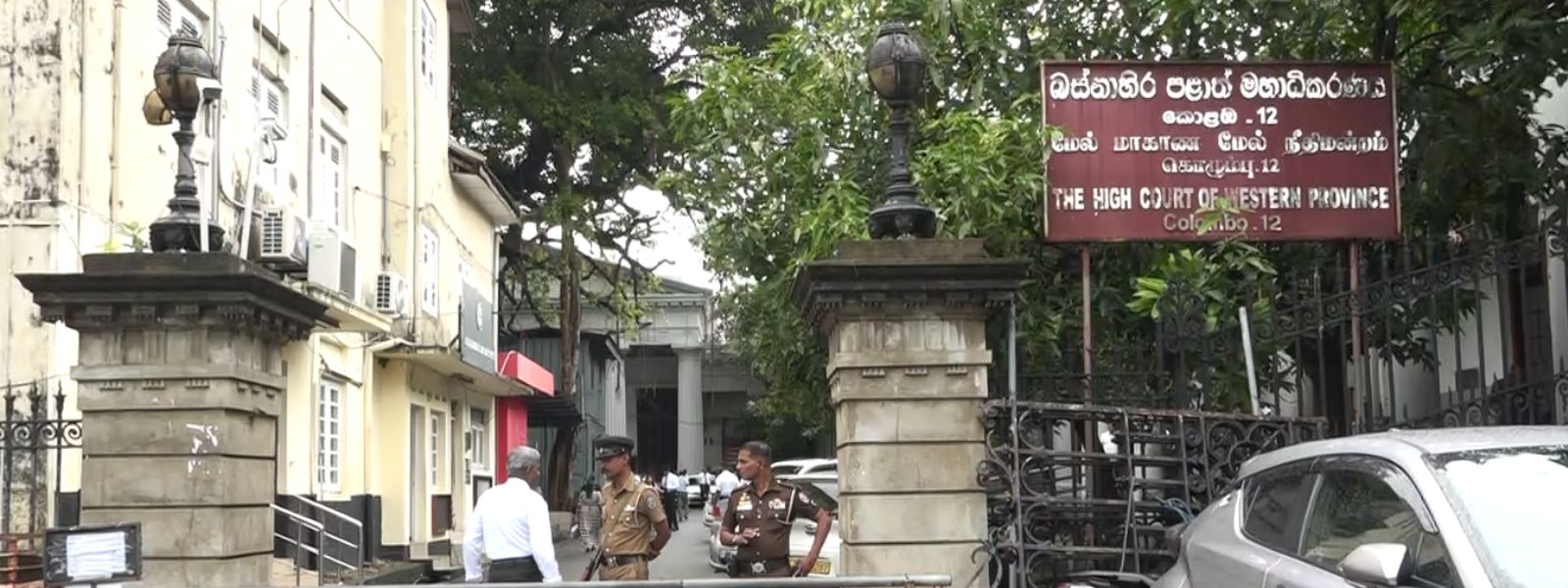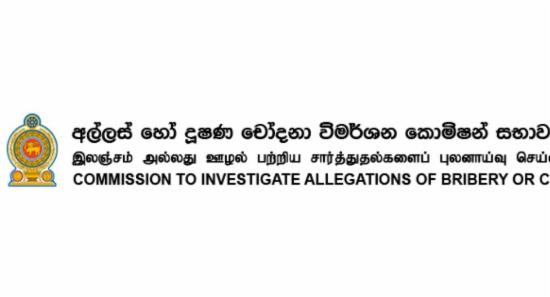.webp)

Landmark Verdict in Sri Lanka’s Elephant Trafficking Case
COLOMBO (News 1st); The Colombo Permanent High Court Trial-at-Bar sentenced Samarappulige Niraaj Roshan, also known as "Ali Roshan," to 15 years of rigorous imprisonment after being found guilty on two serious charges, including the illegal possession of an elephant named 'Singithi' without a valid license.
In addition to the prison sentence, the court imposed a fine of Rs. 20.6 million on the accused.
The bench also ordered that the elephant named 'Singithi' in his possession be declared state property.
Furthermore, the court directed the Director General of Wildlife to take necessary steps to implement the order and ensure the elephants are transferred to state custody.
The verdict against Samarappulige Niraaj Roshan, also known as "Ali Roshan," was delivered by the Colombo Permanent High Court Trial-at-Bar comprising Justices Manjula Thilakaratne, R.S.S. Sapuwida, and Lanka Jayaratne.
Following a lengthy trial, the bench unanimously found the accused guilty on two serious charges.
The court also took into account his prior convictions when determining the sentence.
Presiding Judge Manjula Thilakaratne, delivering the judgment, stated that the defense arguments presented during the trial were rejected by the court.
Quote:
“During the trial, the defense presented an argument stating that under the Fauna and Flora Protection Ordinance, only tuskers are required to be registered, and that registering elephants is not necessary. However, upon reviewing the provisions of the ordinance, the court held that this argument could not be accepted.
Furthermore, the defense argued that the Gazette notification issued regarding the registration of tuskers and elephants had not been approved by Parliament, and therefore could not be considered legally valid. Based on this, the defense claimed that charges against the accused could not be substantiated using the Gazette as a legal foundation. However, the court concluded that the ordinance itself does not refer to such a Gazette notification, and that the possession of tuskers and elephants requires a valid license. The the ordinance clearly stipulates the necessity of obtaining a license to keep elephants in one’s possession. Accordingly, the court rejects all arguments presented by the defense.”
Presiding Judge Manjula Thilakaratne stated that the accused, through the verbal statement made during the course of the trial, had effectively admitted to the offense.
Quote:
“Under Section 22(a)(12) of the Fauna and Flora Protection Ordinance, the elephant taken into custody from the possession of the accused is considered to have been kept without a valid license. Furthermore, the said elephant is interpreted under the ordinance as public property. During the course of this case, it was clearly proven that the elephant was in the possession of the accused. Additionally, through the verbal statement made by the accused during the trial, he admitted that the elephant was indeed in his possession.
Accordingly, it has been proven beyond reasonable doubt that the elephant was in the possession of the accused.”
The judge then stated that, before sentencing the accused, any mitigating factors that could justify a reduction in the punishment should be presented to the court.
At that point, President’s Counsel Anuja Premaratne, appearing on behalf of the accused, addressed the court and requested that a lenient sentence be considered, noting that the accused had endured a prolonged trial and should be treated with compassion.
Responding to this, Deputy Solicitor General Janaka Bandara, representing the prosecution, submitted to the court that the accused should be given the maximum sentence permissible under the law.
Quote:
"Your Honour, every crime has a victim. In this case, the victims are the animals. Unfortunately, there is a tragic reality here — animals cannot come before the court to file complaints. They cannot testify. They do not have a voice to speak. They cannot express the pain and trauma caused by these unlawful acts. This case is a landmark one concerning wildlife trafficking — in fact, it is the first case that directly addresses the illegal trade of elephants. Behind this trafficking network are powerful individuals: politicians, government officials, clergy, and even members of the judiciary. It is through the collusion of these actors that this illegal operation has been carried out. Through his actions, the accused has challenged the authority of the law in this country. According to the Fauna and Flora Protection Ordinance, it is mandatory to obtain a license to possess elephants. But this accused went into the forest, captured a wild elephant, and kept it in his possession without obtaining any legal permit — in clear violation of the law. He has admitted in his own statement before this court that the elephant was in his possession. As a result of this crime, the elephant has become the silent victim. Justice must be served for that voiceless victim. Cases like this — where such crimes are brought before the law and society — are extremely rare. Therefore, Your Honour, I respectfully request that the accused be given the maximum punishment permitted under the law.”
After considering the facts of the case, Presiding Judge delivered the sentencing order, emphasizing that the offense committed by the accused was not merely a statutory violation, but a serious criminal act.
Quote:
“There is currently a serious challenge in protecting elephants living in the wild. One of the main reasons for this situation is the illegal capture of wild elephants by certain individuals. These unlawful activities have become a major obstacle to elephant conservation and pose a significant threat to the country’s ecosystem. Protecting the environment is a responsibility of the people, and through the authority vested by the public, the judiciary also bears a duty to safeguard the environment.
The offense committed by the accused is not merely a statutory violation—it is a grave crime. The prosecution has reported to the court that the value of the illegally possessed elephant is Rs. 6.8 million. Under the Fauna and Flora Protection Ordinance, elephants are also interpreted as public property. Accordingly, for one charge under the Fauna and Flora Protection Ordinance, the accused is sentenced to five years of rigorous imprisonment and fined Rs. 200,000. If the fine is not paid, an additional three months of imprisonment will be imposed. For the charge under the Public Property Act, the accused is sentenced to 15 years of rigorous imprisonment and fined Rs. 20.4 million. If this fine is not paid, an additional four years of imprisonment will be imposed. These sentences are to run concurrently. Therefore, the accused is sentenced to 15 years of rigorous imprisonment.”
However, in connection with this case, the three other accused — former Assistant Director of the Department of Wildlife Conservation Upali Padmasiri, Palihapitiyagamage Jayalath, and Uchitha Nishan Dhammika — were acquitted and released from all charges.
This decision was made because the prosecution failed to prove the allegations against them beyond reasonable doubt.
Delivering the verdict, Justice R.S.S. Sapuwida, a member of the Trial-at-Bar, stated that the prosecution was unable to conclusively establish that the accused had conspired to illegally traffic elephants, knowing that they had been stolen from areas such as Maharagama, Arawwala, Nawala, Battaramulla, and Oruwala between 2009 and 2015.
Quote:
“To prove these charges, determining the age of the elephant is critically important. This is because the conclusion as to whether the elephant physically examined is the same as the one listed in the license depends on the animal’s age. Accordingly, the prosecution presented expert testimony from three veterinary professionals to verify the elephant’s age.
However, one of the witnesses specialized in fish, while another had expertise in livestock reproduction. Upon reviewing their qualifications and experience, the court concluded that they did not possess sufficient expertise to accurately determine the age of an elephant. As a result, the prosecution failed to prove the charges against the accused beyond reasonable doubt. Therefore, all accused individuals were acquitted and released from those charges.”
The Attorney General filed this case against four accused, including Ali Roshan, on charges of illegally possessing five elephants without valid permits by fraudulently altering the elephant registration book maintained by the Department of Wildlife Conservation.
The accused were charged under 33 serious counts, including conspiring to traffic elephants known to have been stolen from areas such as Maharagama, Arawwala, Nawala, Battaramulla, and Oruwala between 2009 and 2015, and unlawfully keeping those elephants in their possession.
The case was filed under the provisions of the Penal Code and the Public Property Act.
Other Articles
Featured News





.png )

-808165_550x300.jpg)




























.gif)